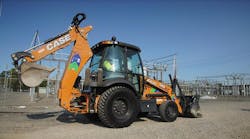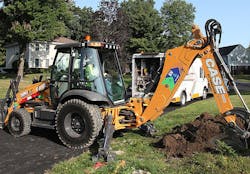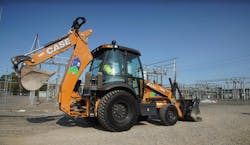Diesel-Free Heavy Equipment Opens Up New Opportunities for Power Electronics
Though not as sexy as the electric air taxis jamming the current news cycle, CASE Construction Equipment's announcement of “Project Zeus,” the industry's first fully electric backhoe loader, may well signal a trend that's more consequential for the environment and the economy, at least in the short-term.
According to the company, its zero-emission backhoe, also known by its production model number "580 EV," has demonstrated the ability to deliver power and performance equivalent to similar-sized diesel-powered backhoes. And, like its on-road counterparts, it boasts near-silent operation and dramatically reduced (up to 90%) operating costs.
Strong, silent, and packing 90 kWh worth of power, CASE's 580 EV represents a growing trend toward electrification of heavy equipment. It also represents a growing number of market opportunities for the power electronics sector. (Credit: CASE Equipment)
Case says the 580 EV is currently in pilot production, with two units recently delivered to New York State Gas & Electric (NYSEG) and Rochester Gas & Electric (RG&E), and one delivered to the National Grid earlier this year. The company says its pilot line can produce several additional units during 2021 in anticipation of ramping up to full commercial production.
A Powerful Design
CASE originally announced Project Zeus in March 2020 and has been working with the three utilities mentioned earlier on refining the machines ahead of final delivery and field deployment. Electrification of the CASE 580 EV was performed in conjunction with New York companies Green Machine Equipment Inc. and Moog Inc. Monroe Tractor in New York. The company will work with each utility and the integration partners to support the equipment in the field.
The resulting design is powered by Green Machine’s proprietary 480-V, 90-kWh lithium-ion WhisperDrive battery pack that can be charged at any 220-V connection. CASE officials say that, while the backhoe's endurance will vary by application and work tempo, the battery was sized to enable a full charge to support the activities associated with most common eight-hour workdays.
The 508 EV's drivetrain and hydraulic motors draw their battery power though independent converter chains. This enables the hydraulics to consistently produce breakout forces equal to diesel-powered machines and deliver improved performance during simultaneous loader and drivetrain operation.
See the CASE 580 EV in action. (Credit: CASE Equipment)
The company says that although the 580 EV uses a new power source, it has been engineered to deliver the same durability, precision, and value that operators expect from their conventionally powered equipment. This includes features such as ProControl that allows for extremely precise boom movement and placement, as well as Comfort Steer, which significantly reduces steering effort and improves precision while working in tight quarters. The 580 EV also features the new and enhanced joystick controls found in the most recent generation of CASE N Series backhoes.
Sustainable for the Environment—and Company Budgets
In addition to low operating costs and an even lower environmental footprint, electrified heavy equipment's near-silent operation reduces operator fatigue and makes it easier to work in neighborhoods and other noise-sensitive areas. (Credit: CASE Equipment)
Besides its planet-sparing zero-emission operation, the 580 EV offers operators several direct and tangible benefits that may provide operational advantages and help improve fiscal sustainability:
- The electric backhoe's near-silent operation and lack of diesel fumes helps make it a welcome presence in residential neighborhoods or other areas where close contact with the public can be a problem.
- While the savings will vary by application and workload, it’s estimated that the 580 EV could save fleets as much as 90% in annual fuel, operation, service, and maintenance costs.
- Utilities that operate their own backhoe fleets can charge them off their own electricity, further reducing their operating costs.
While the 580 EV will be sold at a higher initial price than diesel-powered backhoe loaders, CASE points to studies that estimated the savings produced by a typical fleet of electrified backhoes will pay back that premium in roughly five years. From that point, the machines should put those savings directly into the bottom line, while continuing to lower the operation’s carbon footprint.
An Electric Future
Case's 580 EV may be the world's first battery-electric electric backhoe, but electrification has already begun to take hold in many other parts of the heavy equipment industry. Caterpillar, for example, unveiled its CAT-323F, the worlds' largest battery-electric excavator, in 2019. Since then, companies including Bobcat and Komatsu have begun to aggressively electrify their fleets. You can see what they've been up to in the video below, recently produced by EquipmentWorld, which highlights many of the developments that are accelerating the electrification of heavy equipment.
The world's largest battery-electric excavator in action.
For more information on the CASE 580 EV electric backhoe and details on ordering/commercial availability, visit www.CaseCE.com/580EV .



